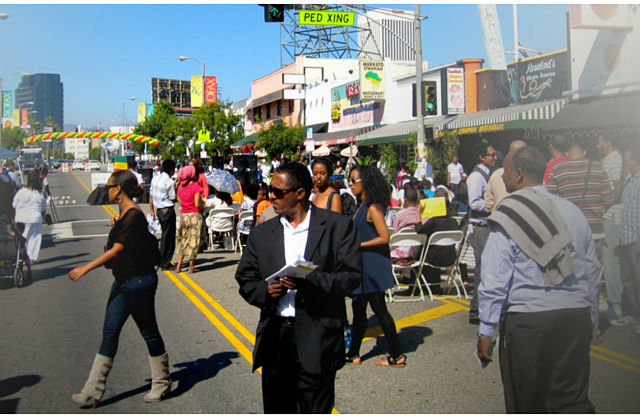 Ethiopian Americans. (Photograph: Tadias archive)
Ethiopian Americans. (Photograph: Tadias archive)
Harvard Politics
By Amen Gashaw
The Other Face of Privilege
As a first-generation Ethiopian American who, while not overtly wealthy, has never worried about the status of her family’s financial stability, and as a resident of one of the most diverse regions in the country, racism had always felt like a distant concept. To my erroneously superficial understanding, while it did not seem as archaic as a mere relic of a bigoted history, I didn’t perceive racism to be of significant pertinence to our world. My neighbors thought I was Indian; waiters spoke to my mother in Spanish at restaurants, and more than half of my high school identified as a person of color, so for years, I’d unassumingly bubbled “Black” into standardized tests without truly internalizing the struggles that came with that label. Having never experienced or personalized the notion of racism and infrequently having been considered “Black” by my community upon first glance, I found myself in desperate need of the very re-education catered to many as “Dear White People.”
The inner dissonance I felt was not an individual occurrence. For a number of my close friends — many Black, all “minorities” — we collectively found that each of us felt relatively divorced from the intrinsic fear and dissatisfaction almost universal in the movement for racial justice. That is not to say that we were not angry — we were, but as objectively privileged spectators and critics of a blatantly unjust institution, rather than as victims of racially motivated prejudice.
To look at racism as an outsider, though, is to exclude oneself from a narrative that cares very little about personal experiences or perceptions. In truth, although relatively affluent people of color and children of immigrants may be brought up in environments starkly juxtaposing the African American canon, it is only a matter of time before one comes face to face with the experiential component of racial injustice. By then, every facet of the “privilege” found in such immigrant communities — exclusive cultural distinctions, communal disassociation, and microaggressive ignorance — will have been undermined by the harsh realities of a society that not only sees color but vilifies it.
Growing up, race was an almost nonexistent part of my socialization; after all, how could my parents teach me about a construct with which they, at least at the time, could not identify and were unfamiliar? As a second-generation immigrant, I had been conditioned to view myself as an exception to the racial “rules” that governed America. At home, I spoke Amharic with my parents, often ate traditional Ethiopian cuisine, wore uniquely “habesha” clothes on special occasions, and endured years of Amharic music blaring through our living room stereo. When out in public, there was an unmistakable camaraderie between my family and the odd Ethiopian passerby to whom we called “Selam” in unison. It would not be an understatement, then, to say that Black culture — vernacular English, hip hop, soul food — had no presence in my house, not out of intentional avoidance but because, truly, “Ethiopian American” and “African American” mean very different things.
This same cultural disconnect extends itself to the millions of other Black immigrants in the United States, a divide that continues to widen as the non-American-born Black population grows exponentially. As a result, key statistical differences arise between immigrant communities and their African American counterparts. The Pew Research Center found that Black immigrants are 37% more likely to have earned a college degree than African Americans. They are also 29% less likely to live in poverty, with incomes exceeding those of African Americans by an average of $10,000. These disparities are certainly not due to intrinsic racial inefficacy in the African American community, as has been falsely and maliciously suggested by proponents of “race science” for centuries. Instead, they can be extrapolated to indicate discrepancies in socioeconomic status, societal respect, and even deliberate moves by immigrants themselves to distinguish their communities from what Americans might view as conventionally “Black.”
Many immigrants and their children naturally segregate themselves in what are known as “ethnic enclaves” — a phenomenon that contributes to the perpetuation of both intentional divisions from mainstream America and subliminally developed prejudices against American-born Black people. On several occasions, I’ve heard immigrant-born adults in my own life simultaneously delineate themselves from and speak pejoratively against African Americans, resorting to the stereotypical and substanceless derogations pinned on the Black community by centuries of de facto American culture: lack of education, cyclical poverty, unkempt hair and dress, salacious and libertine lifestyles.
Due to their disparate cultural environments and tendency to self-isolate, many immigrants are often wealthier, unaccustomed to racial friction in their home countries, and unable to own the history of Black America, from slavery to segregation. Such differences, however, become problematic when used as justification for actively pandering to and perpetuating negative societal perceptions of the African American community. In doing so, immigrants, especially African immigrants, become free riders on the wave of progress towards equality, failing to recognize the grave threat racism poses to their livelihoods as people of color. Unfortunately, whether it manifests itself as higher socioeconomic status, elevated expectations of achievement, or subconscious biases developed against those also considered “Black,” privilege blinds many to the inescapable truth that racism and society’s resultant discrimination of BIPOC, ironically, does not discriminate.
—
Related:
Photos: Ethiopians Show Solidarity with Black Lives Matter in D.C.
Watch: Mahdere Yared on The Long-Term Effects of Racism (TEDx Pine Crest School class of 2021)
Join the conversation on Twitter and Facebook.

























